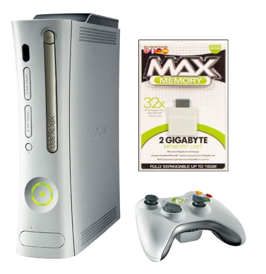Microsoft cites Apple Macs as a defense in Xbox antitrust case
Date: Tuesday, January 26 @ 05:05:53 UTC
Topic: Hardware
If Apple can prevent another computer maker from selling unauthorized Mac OS X machines, then Microsoft should be able to stop another accessory vendor from selling unauthorized Xbox 360 plugins loaded with video-game cheats.
 That's one of the arguments the Redmond company makes in a new motion to dismiss an antitrust lawsuit filed in November by Datel Design & Development, a maker of attachable memory units and game controllers for the Microsoft console. That's one of the arguments the Redmond company makes in a new motion to dismiss an antitrust lawsuit filed in November by Datel Design & Development, a maker of attachable memory units and game controllers for the Microsoft console.
Whether or not you buy Microsoft's contention, it's a pretty fascinating twist in a case that could ultimately determine the rules of competition in the business of video game consoles, games and accessories.
Quick background: Datel argues that Microsoft is monopolizing the market for "Multiplayer Online Dedicated Gaming Systems," and using that position to unfairly control the related market for video-game accessories -- in this case by putting up technological barriers to Datel memory units and controllers that compete with Microsoft's own Xbox 360 accessories.
Click the link to read the entire story and view the source.
But here's the key point from an antitrust perspective: Datel defines that market as just the Playstation 3 and the Xbox 360, and no other consoles. The obvious question: What about the Nintendo Wii? If the Wii were included, clearly it would be the dominant player in the market, making antitrust claims against the Xbox 360 less plausible.
"Nintendo's Wii system has limited multiplayer functionality and is widely understood to be designed with families and casual gainers in mind," Datel said in its initial complaint. (PDF, 20 pages) "The Wii's reduced functionality and lower price point reflect a target market that is distinct from that of Microsoft's Xbox 360 and Sony's Playstation 3. Accordingly, the Wii is not regarded by consumers as reasonably interchangeable with the Xbox 360 and the Playstation 3, and the cross-elasticity of demand between these products and the Wii is low."
Ouch. Nintendo won't be blurbing that on any slides at E3 this year.
In its motion to dismiss (PDF, 30 pages) filed Friday afternoon, Microsoft argues that the relevant market, for antitrust purposes, is actually significantly larger than Datel contends. Microsoft says the market includes not only the Xbox 360, PS3, and Wii but also handheld gaming systems and even one previous-generation console.
"Datelís monopolization theory depends on excluding from the relevant market numerous products that fit Datelís own definition, such as the Nintendo Wii, the Nintendo DS, the Sony PSP, and the Sony PlayStation 2 ó all multiplayer online dedicated gaming systems," the Microsoft motion says. "Many of these products have outsold the Xbox 360 (perhaps explaining Datelís desire to exclude them from its constricted market definition). The only rationale Datel provides is that the Nintendo Wii is cheaper and has somewhat less functionality than the Xbox 360. But the law is quite clear that markets cannot be defined 'by price variances or product quality variances. Such distinctions are economically meaningless.' "
When's the last time you heard Microsoft pointing out that some of its competitors have outsold the Xbox 360? Sometimes it's actually refreshing when lawyers get involved. Of course, it's for a higher cause in Microsoft's eyes, in support of its contention that its Xbox 360 business needn't be subject to antitrust scrutiny.
But more than that, Microsoft argues that its crackdown on Datel is legally allowable because of laws that block antitrust claims in situations when purchasers in a "single-brand aftermarket" (in this case the Xbox ecosystem) were made aware in advance that any aftermarket products (in this case the memory units and controllers) would need to come from or be authorized by the same company that offers the primary product (the Xbox 360).
And here is where the Apple defense comes in. To support that part of its argument, Microsoft cites Apple's case against Psystar, a maker of Mac clones, non-Apple machines sold with the Mac OS X operating system.
Microsoft points out in its filing that Psystar responded with antitrust claims "much like those alleged by Datel, alleging that Apple had sought to monopolize a primary market for the Mac OS as well as the aftermarket for hardware that could be used with the Mac OS and had tied the Mac OS to its own hardware."
In that case, the judge came down in favor of Apple, based on the fact that Apple's End User License Agreement, better known as a EULA, restricts the Mac operating system from use on non-Apple hardware.
Microsoft writes in its filing that, in the same way, "Xbox 360 purchasers knowingly and voluntarily gave Microsoft the right to prohibit the use of unauthorized accessories," adding that "each Xbox 360 comes packaged with a software license requiring consumers to agree that the Xbox 360 software can be used only with Microsoft authorized accessories."
The company argues that Datel's cheat-friendly products diminish the experience for other gamers on the Xbox Live online gaming system -- quoting Datel marketing materials that say its products are "preloaded with hundreds of game-busting cheats."
At the same time, the pricing comparison doesn't exactly make Microsoft look good. Whether or not it plays into the legal case, Datel offered a better value in terms of storage-capacity-per-dollar, selling a 2 GB memory unit for $39.99, while Microsoft sells a 512 MB unit for $29.99.
Microsoft's motion is scheduled for a March 2 hearing at U.S. District Court in San Francisco.
News-Source: www.techflash.com
|
